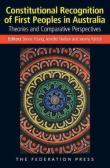 2360411154496190355.jpg
2360411154496190355.jpg
 Constitutional Recognition of First Peoples in Australia : Theories and Comparative Perspectives
anthology
Constitutional Recognition of First Peoples in Australia : Theories and Comparative Perspectives
anthology
 2360411154496190355.jpg
2360411154496190355.jpg
 Constitutional Recognition of First Peoples in Australia : Theories and Comparative Perspectives
anthology
Constitutional Recognition of First Peoples in Australia : Theories and Comparative Perspectives
anthology
'This collection of essays explores the history and current status of proposals to recognise Aboriginal and Torres Strait Islander Peoples in the Constitution of Australia. The book had its genesis in a colloquium co-hosted by the University of Southern Queensland and Southern Cross University, attended by scholars from Australia and overseas and prominent participants in the recognition debates. The contributions have been updated and supplemented to produce a collection that explores what is possible and preferable from a variety of perspectives, organised into three parts: 'Concepts and Context', 'Theories, Critique and Alternatives', and 'Comparative Perspectives'. It includes work by well-regarded constitutional law scholars and legal historians, as well as analysis built from and framed by Indigenous world views and knowledges. It also features the voices of a number of comparative scholars - examining relevant developments in the United States, Canada, the South Pacific, the United Kingdom, New Zealand and South America. The combined authorship represents 10 universities from across Australia, the United Kingdom, the United States and Canada. The book is intended to be both an accurate and detailed record of this critical step in Australian legal and political history and an enduring contribution to ongoing dialogue, reconciliation and the empowerment of Australia's First Peoples.' (Publication summary)
'Constitutional recognition of First Peoples in Australia is an excellent collection of essays that brings together some of the pre-eminent thinkers around the continuing debate as to how to recognise our First Peoples in our founding document — the Australian Constitution. The book allows readers to immerse themselves in the progress — or, as some of us would say, the lack of progress — for constitutional change in a well-thought out journey. It is structured, well written and very readable.' (Introduction)
 [Review] Indigenous Australians, Social Justice and Legal Reform: Honouring Elliott Johnston, Constitutional Recognition of First Peoples in Australia: Theories and Comparative Perspectives, Treaty and Statehood: Aboriginal Self-determination
2017
21789947
2017
single work
review
[Review] Indigenous Australians, Social Justice and Legal Reform: Honouring Elliott Johnston, Constitutional Recognition of First Peoples in Australia: Theories and Comparative Perspectives, Treaty and Statehood: Aboriginal Self-determination
2017
21789947
2017
single work
review
'I approach these books as a lawyer with interests in history, governance and the development of law and legal systems, but very little background in Indigenous studies. My hope, in reading and reviewing this substantial body of work, was that I would learn more about Indigenous law. That hope has not been disappointed.'
 [Review] Indigenous Australians, Social Justice and Legal Reform: Honouring Elliott Johnston, Constitutional Recognition of First Peoples in Australia: Theories and Comparative Perspectives, Treaty and Statehood: Aboriginal Self-determination
2017
21789947
2017
single work
review
[Review] Indigenous Australians, Social Justice and Legal Reform: Honouring Elliott Johnston, Constitutional Recognition of First Peoples in Australia: Theories and Comparative Perspectives, Treaty and Statehood: Aboriginal Self-determination
2017
21789947
2017
single work
review
'I approach these books as a lawyer with interests in history, governance and the development of law and legal systems, but very little background in Indigenous studies. My hope, in reading and reviewing this substantial body of work, was that I would learn more about Indigenous law. That hope has not been disappointed.'
'Constitutional recognition of First Peoples in Australia is an excellent collection of essays that brings together some of the pre-eminent thinkers around the continuing debate as to how to recognise our First Peoples in our founding document — the Australian Constitution. The book allows readers to immerse themselves in the progress — or, as some of us would say, the lack of progress — for constitutional change in a well-thought out journey. It is structured, well written and very readable.' (Introduction)
 [Review] Indigenous Australians, Social Justice and Legal Reform: Honouring Elliott Johnston, Constitutional Recognition of First Peoples in Australia: Theories and Comparative Perspectives, Treaty and Statehood: Aboriginal Self-determination
2017
21789947
2017
single work
review
[Review] Indigenous Australians, Social Justice and Legal Reform: Honouring Elliott Johnston, Constitutional Recognition of First Peoples in Australia: Theories and Comparative Perspectives, Treaty and Statehood: Aboriginal Self-determination
2017
21789947
2017
single work
review
'I approach these books as a lawyer with interests in history, governance and the development of law and legal systems, but very little background in Indigenous studies. My hope, in reading and reviewing this substantial body of work, was that I would learn more about Indigenous law. That hope has not been disappointed.'
 [Review] Indigenous Australians, Social Justice and Legal Reform: Honouring Elliott Johnston, Constitutional Recognition of First Peoples in Australia: Theories and Comparative Perspectives, Treaty and Statehood: Aboriginal Self-determination
2017
21789947
2017
single work
review
[Review] Indigenous Australians, Social Justice and Legal Reform: Honouring Elliott Johnston, Constitutional Recognition of First Peoples in Australia: Theories and Comparative Perspectives, Treaty and Statehood: Aboriginal Self-determination
2017
21789947
2017
single work
review
'I approach these books as a lawyer with interests in history, governance and the development of law and legal systems, but very little background in Indigenous studies. My hope, in reading and reviewing this substantial body of work, was that I would learn more about Indigenous law. That hope has not been disappointed.'